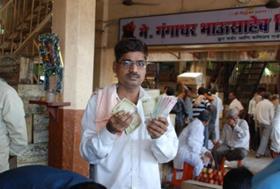
Local vegetable prices have crashed in India’s rural areas but remain stable in many major cities after 500 and 1,000 rupee notes were rendered invalid last month, the Times of India reports.
India’s fruit and vegetable industry largely runs on cash transactions, yet demonetisation has affected trade more severely in agricultural regions than urban areas, the paper said.
An analysis of arrivals and prices data from 29 big cities in major states and Delhi shows that for a range of common vegetables, arrivals in farmers markets have actually gone up since 8 November when 500 and 1,000-rupee notes were taken out of circulation.
Wholesale traders in Delhi said this was driven by the fact that cash payments were still possible in bigger cities, unlike small rural markets. So, in the surrounding areas, there was a move to sell the produce in urban areas.
As a result, barring okra and onions, the quantities of common vegetables like cauliflower, potato, tomato, cabbage, gourds, chillies, aubergines and peas reaching daily in wholesale markets of major cities increased by 10-30 per cent between the week preceding 8 November and the fortnight following it, the report said.